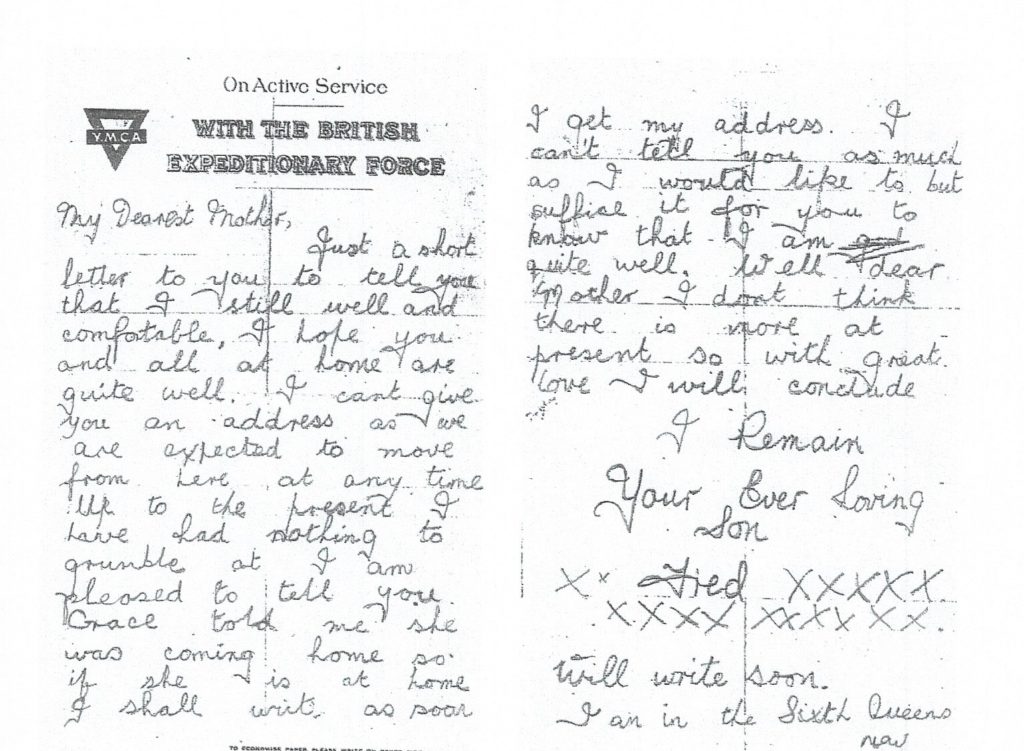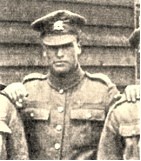66859 PRIVATE FREDERICK GEORGE SONES
6TH (SERVICE) BATTALION, THE QUEENS
(ROYAL WEST SURREY REGIMENT)
KILLED IN ACTION
7TH SEPTEMBER 1918
AGE 18 YEARS
Frederick, known to all as Fred, was another young Halesworth lad who would lose his life during his teenage years, while fighting on the western front. He was born during the last quarter of 1899, the fourth child of a footwear shop assistant, Alfred Sones, and his wife Anna (née Ninham) who had hailed from the village of Ditchingham on the Norfolk-Suffolk border. It appears that Fred and his sibling’s early life was not a happy one, as their mother had given birth to a total of ten children but regrettably two of them had been stillborn, with a third dying at the age of just one year. This possibly could have caused some upset between his parents as, at the time of the 1911 Census, Anna was living in her home at 97 Chediston Street with five of her children including young Fred, while her husband Alfred was listed as an inmate of the nearby Blything Union Workhouse. A possible reason for this may have been that Alfred had turned to drink. A report in the Halesworth Times newspaper of 2nd September 1913 relates that during the early afternoon of Saturday 16th August, Alfred had been drinking with his brother Walter in the bar of the Station Hotel, Halesworth, when the barmaid had refused to serve any more drinks to Walter. He had then attempted to grab Alfred’s beer mug. This then developed into an argument between the brothers, after which Walter had left the bar, no doubt in an angry mood. Shortly after he had left, John Collett, who had been walking by the hotel, called out to Alfred that his brother had collapsed in the road and was unconscious, Alfred, with the help of John, had then managed to carry Walter to the Patrick Stead Hospital where he later died. At the inquest the local doctor P.J. De Nyssen confirmed that Walter George Sones aged 46 years had died of a fractured skull while intoxicated. It appears that all of this family upset had not affected young Fred who was now a very keen member of the local Scouts group. After Fred’s death in 1918, the District Scoutmaster Mr C.B. Andrews wrote in glowing terms about Senior Patrol Leader F Sones, stating that during his three years of service with the Halesworth Troop, he had set a great example of what a scout should be, being clean, loyal, manly and with an inborn courtesy and that the town’s Boy Scouts, in their first supreme sacrifice on the altar of the Empire, had given of their best. As a further indication of how well Fred had been thought of on leaving school in 1913, he must have done well, as he secured employment with Mr Fairweather’s printing office at 16 Bridge Street where a good standard of reading and writing would have been essential.
An article published in the Halesworth Times newspaper of 17th September 1918 in which they announced his death, related how Fred had been conscripted into the army after his eighteenth birthday in the spring of 1918, at first being enlisted to serve as 27064, a Private Soldier in the ‘Buffs’ (East Kent Regiment). The photograph of Fred above shows him no doubt during training, wearing the brass cap badge of the Buffs. At some time later he was transferred to join the 6th (Service) Battalion, ‘The Queens’ (Royal West Surrey Regiment) with the new number of G/66859. His new battalion, having Service in its title, showing that it had been another war-raised unit following Lord Kitchener’s appeal for the raising of a whole citizen new army. First formed at Guildford, Surrey in August 1914, the 6th Queens, after training in the south of England, crossed to France as part of the 12th (Eastern) Division in May 1915. It appears that Fred, having himself arrived in France, eventually joined a draft of one Officer and one hundred and sixty-three Other Ranks who were despatched to join the 6th Queens on 26th August 1918. At that time they were situated in the area of Fricourt, in the Somme region of northern France. Shortly after arriving he had written an undated letter to his mother, now living in her new home at 79 London Road (see below). In it he explains to her that he is now serving with the 6th Queens and at the present time is unable to let her know his address as they were expecting to be moved at any time. Sadly, although he asked about other members of their family, there is no reference to his father Alfred. Within twelve days of his joining his battalion, their war diary for the day of Fred’s death on 7th September reports that they were in positions to the west of the town of Nurlu where, at 2.30am, they had moved to their assembly area in preparation for their attack on the German positions situated on the high ground to the north of Guvencourt, with zero hour set for 8am. Exactly on time the men of the 6th Queens mounted the parapet of their trenches and advanced across ‘No Man’s Land’. Initially they were held up by heavy German machine gun fire, while also having to attack up hill, but they fought on, capturing the enemy’s positions within a very short time, while members of their ‘D’ Company managed to shoot down an enemy aircraft. During the reorganisation phase their casualty lists were made up, with a total twenty-nine men found to be killed in action, including poor Fred in this his first taste of battle. In the previously mentioned article in the town’s newspaper his mother Anna reported of her loss through a letter she had received from her son’s platoon officer. After his death Fred was laid to rest in the Peronne Communal Cemetery Extension on the Somme where he remains today with over one thousand, four hundred other men who lost their lives.
Interestingly, on his enlistment papers Fred had named his father Alfred as his next of kin, therefore eligible to receive any gratuities to be paid after his death. On 18th August 1919, Alfred received the second payment of a total amounting to £5.8s.9d (£5.44p), while his mother Anna received a weekly pension of 5s 0d (25p) per week.
On 22nd September 1919 his mother placed a Remembrance notice in the Halesworth Times in which she remembered Fred and also her late daughter Eva Maud, aged 20 years, who had passed away just six weeks after hearing of Fred’s loss.
As well as the financial awards for the loss of their son, his parents would also have been entitled to claim Fred’s service medal awards, of the British War and Victory medals and his named Memorial Plaque and Scroll.
The location of these is unknown.


